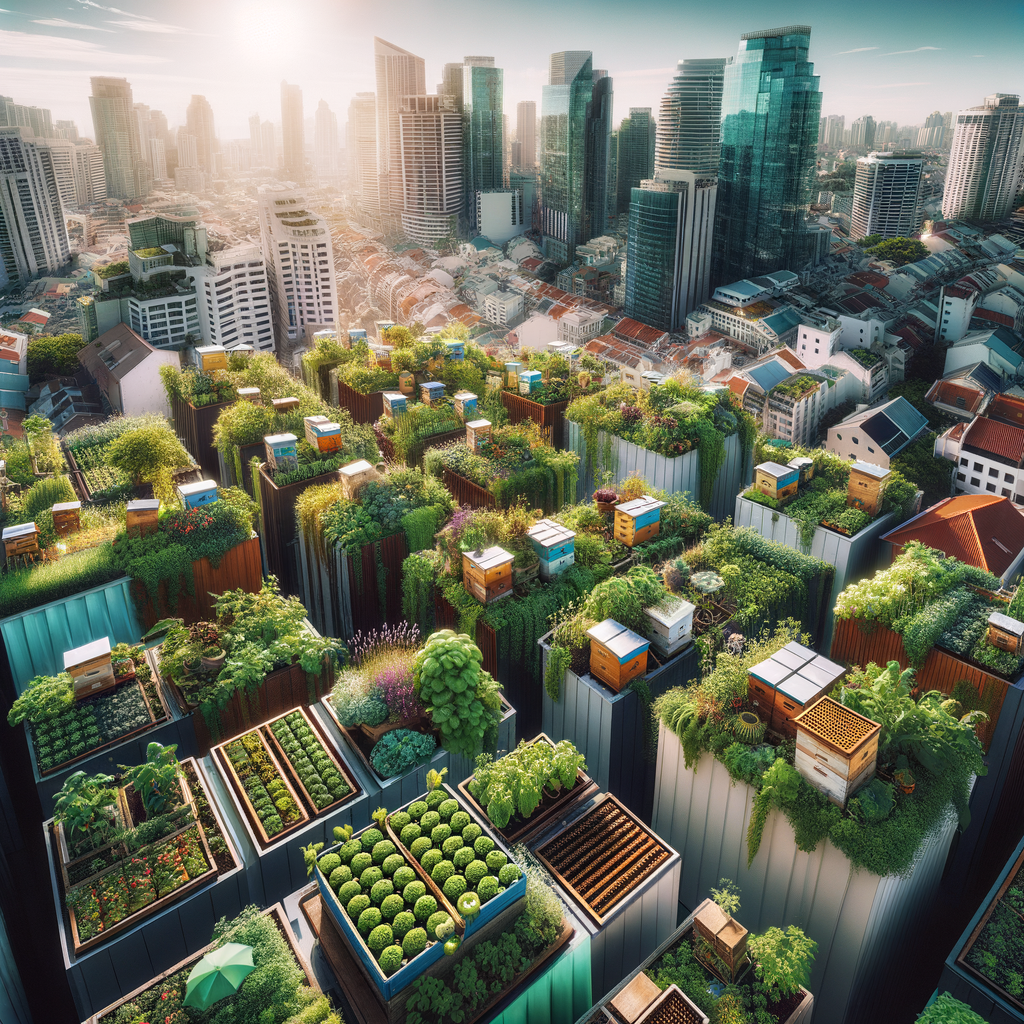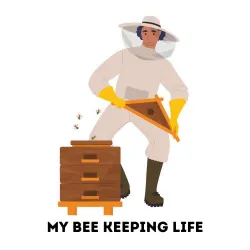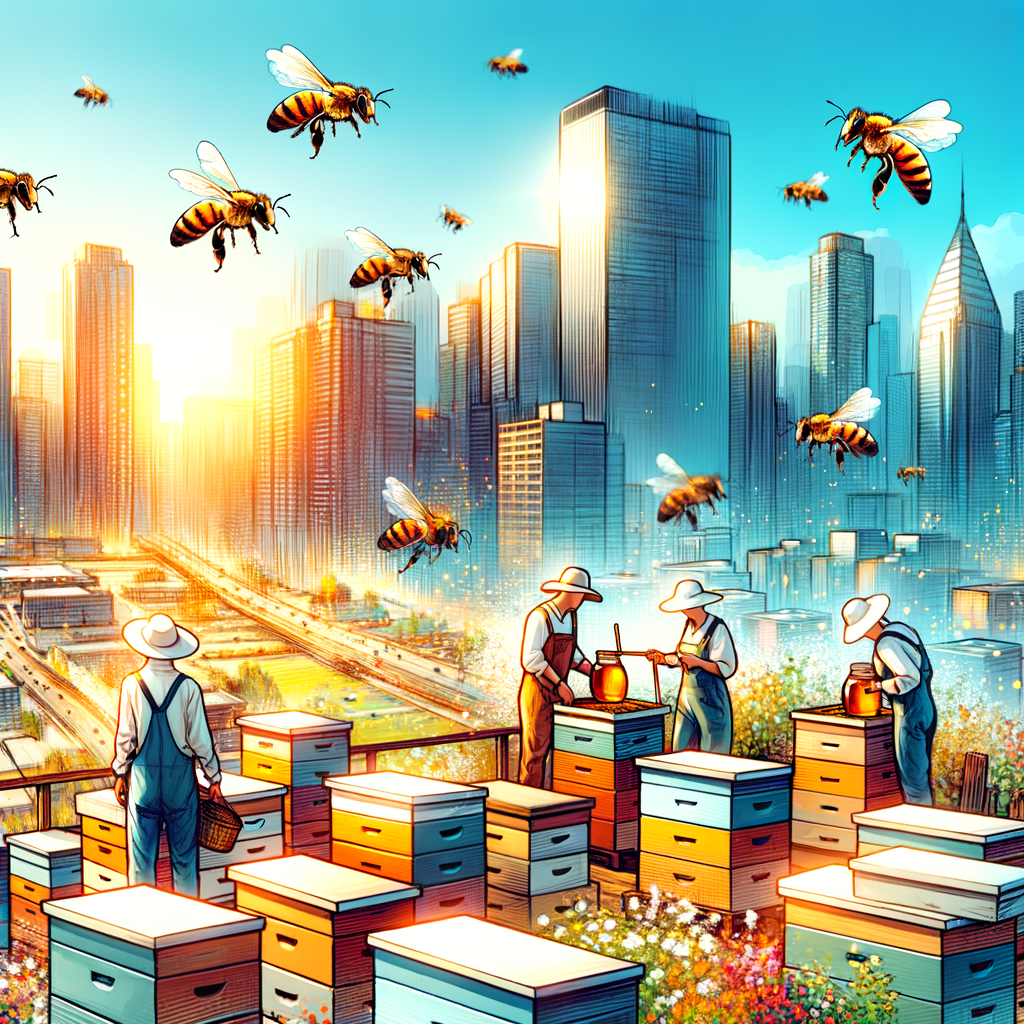
Introduction to Urban Beekeeping
Urban beekeeping is a fascinating and important topic that is gaining popularity in cities around the world. This practice involves keeping bees in an urban environment and can play a significant role in promoting sustainable food systems. In this section, we will explore the concept of urban beekeeping, its importance in urban areas, and the role of urban hives in sustainable food systems.
- Definition of Urban Beekeeping
- Importance of Beekeeping in Urban Areas
- Overview of the Role of Urban Hives in Sustainable Food Systems
Urban beekeeping, also known as city or rooftop beekeeping, is the practice of maintaining bee colonies in urban areas. This can be done on rooftops, balconies, backyards, or any other available urban space. The bees are kept in hives, just like in traditional rural beekeeping, but the environment is different. The goal is to produce honey, beeswax, and other products, but urban beekeepers also play a vital role in supporting the local bee population and contributing to biodiversity.
Beekeeping in urban areas is crucial for several reasons. Firstly, it helps increase the bee population, which is essential for pollination and, consequently, food production. Bees play a vital role in pollinating plants, including those that produce the fruits, vegetables, and nuts we eat. Secondly, urban beekeeping can help improve local biodiversity, as bees pollinate a wide variety of plants. Lastly, it provides an opportunity for city dwellers to connect with nature and learn about the importance of bees in our ecosystem.
Urban hives play a significant role in creating sustainable food systems. By pollinating local plants and crops, bees help increase food production and contribute to food security. Moreover, the honey and other products produced by urban hives can provide a local, sustainable source of food and income. Urban beekeeping also promotes biodiversity, which is key to a healthy and resilient food system.
In the following sections, we will delve deeper into the intersection of urban agriculture and beekeeping, the role of urban beekeeping in creating sustainable food systems, and the challenges and solutions associated with this practice. Stay tuned to learn more about the exciting world of urban beekeeping!
The Intersection of Urban Agriculture and Beekeeping
Urban agriculture and beekeeping are two practices that may seem unrelated at first glance. However, they intersect in many ways, contributing to sustainable food systems and biodiversity in cities. Let’s delve into the world of urban agriculture first.
Understanding Urban Agriculture
Urban agriculture is a term that might be new to some. So, what is it, and why is it important?
- Definition and importance of urban agriculture: Urban agriculture refers to the practice of cultivating, processing, and distributing food in or around urban areas. It’s not just about growing food in cities; it’s also about community, health, and sustainability. Urban agriculture can help reduce food miles, improve local food security, and contribute to a city’s overall sustainability.
- Examples of urban farming practices: Urban agriculture can take many forms. It includes practices like rooftop farming, where crops are grown on the roofs of buildings; vertical farming, where food is grown in stacked layers; and community gardens, where local residents can grow their own food. These practices make use of limited urban space and can be adapted to suit the local climate and resources.
- Role of urban agriculture in food security: Urban agriculture plays a crucial role in enhancing food security in cities. It provides fresh, local produce, reducing reliance on imported food. In addition, urban farming can offer a reliable food source for low-income communities, helping to combat food deserts in urban areas.
Now that we have a better understanding of urban agriculture, let’s explore how beekeeping fits into this picture in the next section.
Role of Beekeeping in Urban Agriculture
Urban beekeeping plays a significant role in city agriculture. This practice contributes to the enhancement of crop yield, honey production, and biodiversity. Let’s delve into these aspects in more detail.
- Enhancement of Crop Yield through Pollination
Bees are nature’s most efficient pollinators. They transfer pollen from the male parts of a flower to the female parts, enabling the production of fruits and seeds. In urban agriculture, bees can significantly improve the yield of rooftop gardens and urban farms. For example, a study in New York City found that rooftop gardens with beehives had a 71% higher yield than those without. Thus, urban beekeeping can help increase food production in cities.
- Honey Production in Cities
Urban beekeeping also leads to the production of local honey. City bees often have a diverse range of flowers to forage from, leading to unique honey flavors. This honey can be sold at local markets, contributing to the local economy. In cities like London and New York, urban honey has become a sought-after product, with some jars selling for as much as $20.
- Contribution to Biodiversity
Bees contribute to biodiversity in cities by pollinating a wide variety of plants. This helps maintain a diverse urban ecosystem, which is important for the health of our cities and the planet. For instance, in Berlin, Germany, urban beekeeping has helped increase the number of wildflower species in the city, contributing to a richer urban biodiversity.
| Role of Urban Beekeeping | Impact |
|---|---|
| Enhancement of Crop Yield | Increased food production in cities |
| Honey Production | Contribution to local economy |
| Contribution to Biodiversity | Richer urban ecosystem |
In conclusion, urban beekeeping plays a crucial role in urban agriculture. It enhances crop yield, contributes to local economies through honey production, and promotes biodiversity. As we continue to explore sustainable urban farming practices, the importance of bees in our cities cannot be overstated.
Urban Beekeeping for Sustainable Food Systems
Urban beekeeping is a practice that is gaining popularity and recognition for its role in promoting sustainable food systems. But before we delve into how urban beekeeping contributes to sustainability, let’s first understand what sustainable food systems are and the role of urban food production in these systems.
Understanding Sustainable Food Systems
A sustainable food system is a type of food system that provides healthy food to people while also protecting the environment. It aims to be fair to both the earth and people.
- Definition and importance of sustainable food systems: A sustainable food system is one that ensures food security and nutrition for all without compromising the economic, social, and environmental bases to generate food security and nutrition for future generations. It is important because it helps maintain our planet’s health, supports local economies, and promotes fair labor practices.
- Role of urban food production in sustainable food systems: Urban food production plays a significant role in sustainable food systems. It helps reduce the distance food travels from farm to table, which cuts down on greenhouse gas emissions. It also promotes local economy and provides fresh, healthy food to urban residents. Urban beekeeping, as a form of urban food production, plays a crucial role in this system.
Now that we have a better understanding of sustainable food systems and the role of urban food production, we can explore how urban beekeeping fits into this picture in the next section.
Contribution of Urban Beekeeping to Sustainable Food Systems
Urban beekeeping plays a pivotal role in promoting sustainable food systems. This is achieved in several ways, including boosting local food production through pollination, providing local, sustainable honey, and through successful urban beekeeping initiatives. Let’s delve into these contributions.
- Boosting local food production through pollination
Bees are nature’s most efficient pollinators. They help in the fertilization of flowers by transferring pollen from the male parts to the female parts of a flower. This process is crucial for the production of fruits and vegetables. In urban settings, beekeeping can significantly increase local food production. For instance, a study in New York City found that urban gardens with beehives had a 71% higher yield compared to those without.
- Providing local, sustainable honey
Urban beekeeping also contributes to sustainable food systems by providing local, sustainable honey. Unlike commercially produced honey, which often involves long-distance transportation and the use of pesticides, urban-produced honey is local and natural. It reduces the carbon footprint associated with food transportation and promotes food security by providing a reliable source of sweetener within the city.
- Case study: Successful urban beekeeping initiatives
There are numerous successful urban beekeeping initiatives across the globe. For example, in London, the ‘Bee Urban’ project has transformed neglected city spaces into thriving bee habitats. This initiative not only boosts local food production and provides sustainable honey but also educates the community about the importance of bees to our food system.
| Key Contributions of Urban Beekeeping |
|---|
| Boosts local food production through efficient pollination |
| Provides local, sustainable honey |
| Promotes successful urban beekeeping initiatives |
In conclusion, urban beekeeping is a key contributor to sustainable food systems. It boosts local food production, provides sustainable honey, and promotes successful urban beekeeping initiatives. By supporting urban beekeeping, we can help create a more sustainable and food-secure future.
Challenges and Solutions in Urban Beekeeping
Urban beekeeping, although beneficial, comes with its own set of challenges. However, with the right knowledge and solutions, these challenges can be overcome. Let’s delve into the common challenges faced by urban beekeepers and explore possible solutions.
Common Challenges in Urban Beekeeping
Urban beekeeping, while rewarding, presents some unique challenges. These include regulatory hurdles, public perception and education, and urban environmental challenges. Let’s take a closer look at each of these.
- Regulatory hurdles: In many cities, there are strict regulations and laws concerning beekeeping. These laws can limit the number of hives a beekeeper can have, where they can be located, and even if beekeeping is allowed at all. Navigating these laws can be a daunting task for new and experienced beekeepers alike.
- Public perception and education: Many people have a fear of bees, often due to a lack of understanding about these crucial pollinators. This fear can lead to complaints and conflicts with neighbors, making urban beekeeping a challenging endeavor.
- Urban environmental challenges: Urban environments can pose unique challenges for bees. These include a lack of diverse food sources, exposure to pesticides, and the heat island effect, which can make cities significantly warmer than rural areas.
Despite these challenges, urban beekeeping is not only possible but can be incredibly rewarding. With the right strategies and solutions, these challenges can be overcome, leading to a thriving urban beekeeping community.
Stay tuned for our next section where we will discuss solutions and best practices for urban beekeeping, including advocacy and policy change, public education and engagement, and designing bee-friendly urban spaces.
Solutions and Best Practices for Urban Beekeeping
Urban beekeeping, while challenging, can be a rewarding and beneficial practice. There are several solutions and best practices that can help overcome the hurdles and make urban beekeeping a success. Let’s explore these in detail.
- Advocacy and Policy Change
- Public Education and Engagement
- Designing Bee-Friendly Urban Spaces
One of the first steps towards successful urban beekeeping is advocating for policy changes. Many cities have strict regulations that limit or even prohibit beekeeping. Advocacy can help change these policies and create a more bee-friendly environment. For instance, in 2010, New York City lifted its ban on beekeeping after a strong advocacy campaign by local beekeepers and environmentalists.
Public education is key to changing perceptions about bees and beekeeping. By educating the public about the importance of bees for our ecosystem and food supply, we can foster a more accepting and supportive environment for urban beekeeping. Engagement can take many forms, from school programs to community workshops, all aimed at raising awareness and understanding.
Lastly, designing bee-friendly urban spaces is a practical way to support urban beekeeping. This can include planting bee-friendly flowers, creating rooftop gardens, and even designing urban parks with bees in mind. These spaces not only provide a habitat for bees but also add to the beauty and biodiversity of the city.
| Best Practice | Example |
|---|---|
| Advocacy and Policy Change | New York City lifting its ban on beekeeping in 2010 |
| Public Education and Engagement | School programs and community workshops on beekeeping |
| Designing Bee-Friendly Urban Spaces | Planting bee-friendly flowers, creating rooftop gardens |
In conclusion, urban beekeeping can thrive with the right solutions and best practices in place. By advocating for policy change, educating the public, and designing bee-friendly spaces, we can create an urban environment where bees and humans coexist harmoniously.
Conclusion: The Future of Urban Beekeeping
As we wrap up our discussion on urban beekeeping, it’s important to look ahead at what the future holds. The role of urban beekeeping in our cities is becoming increasingly important for a number of reasons.
- Importance of beekeeping for food security in urban areas
Urban beekeeping plays a crucial role in enhancing food security in our cities. Bees are vital pollinators, and their work helps our plants to produce the fruits and vegetables we eat. In fact, it’s estimated that bees are responsible for pollinating about one-third of the food we consume. As urban areas continue to grow, the role of urban beekeeping in ensuring food security will become even more important.
- Role of urban beekeeping in sustainable urban food systems
Urban beekeeping also plays a key role in creating sustainable urban food systems. By keeping bees in our cities, we can produce local honey and other bee products, reducing the need for transportation and the associated carbon emissions. Plus, urban beekeeping encourages biodiversity and helps to green our cities, contributing to a healthier urban environment.
- Future trends and opportunities in urban beekeeping
Looking ahead, there are many exciting trends and opportunities in urban beekeeping. For example, rooftop beekeeping is becoming increasingly popular, with businesses and individuals alike setting up hives on top of city buildings. This not only provides a habitat for bees, but also helps to utilize unused urban spaces. Additionally, there’s a growing interest in beekeeping among young people, which bodes well for the future of this important practice.
In conclusion, the future of urban beekeeping looks bright. As we continue to recognize the importance of bees for our food security and urban sustainability, we can expect to see more and more hives popping up in our cities. And that’s something to be excited about.








